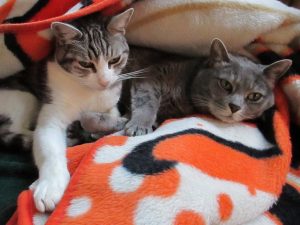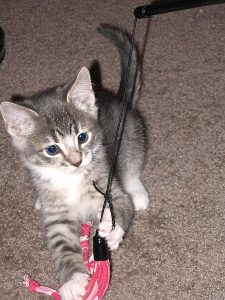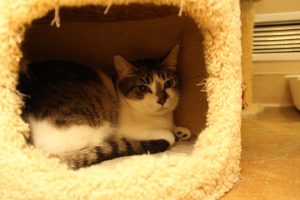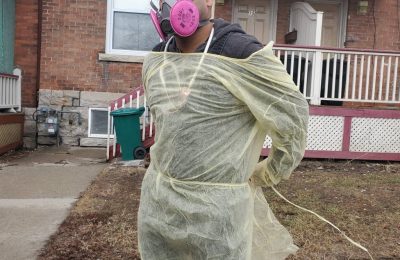
My dear friend Julie Hecht recently posted excellent advice on how to help dogs that might get stressed out about fireworks on her excellent blog DogSpies. We sometimes forget that cats can be afraid of the 4th too! They aren’t huge fans of loud noises, and the unpredictability of fireworks can make them especially hard to habituate too.
Some cats are more adept at hiding their fear, or they might spend a lot of their time hiding anyway (note: this should not be accepted as “normal cat behavior”). So how can you make sure your cats aren’t terrified of the Fourth?
Safety first: Make sure they’re inside! Even if your cats normally go outside, the 4th of July is not a good day for them to roam. If they get frightened, they may run and hide or even get lost. Injuries from fireworks are another reason to keep your kitty confined on this holiday.

Provide hiding spaces – make sure your cat has some cozy places to hide (not just under the bed). I prefer clamshell cat beds or pods, cardboard boxes tipped on their side, and cat carriers make excellent safe spaces if your cat has been trained that carriers = good. Some cats prefer to hide up high in a cat tree with a cubby.
 Consider a “quiet room” – some cats do best if confined away from the noise and activity – especially if you are having guests over for a BBQ and there will be other chaos on top of the fireworks! Frequently opened doors are a good opportunity for a panicked cat to run outside, so sometimes it is safest to set up a bedroom or office as a safe room with everything the cat needs inside (food, water, litter box, cozy thing)…and the door closed.
Consider a “quiet room” – some cats do best if confined away from the noise and activity – especially if you are having guests over for a BBQ and there will be other chaos on top of the fireworks! Frequently opened doors are a good opportunity for a panicked cat to run outside, so sometimes it is safest to set up a bedroom or office as a safe room with everything the cat needs inside (food, water, litter box, cozy thing)…and the door closed.
Buffer sounds – fans, white noise machines, classical music, and talk radio can all help buffer the loud, unpredictable boom of fireworks.

Play therapy! Don’t forget that play is a great way to help your cat be more calm and confident. Try a nice lengthy play session for your cat with an interactive toy earlier in the day. Give your cat a snack afterward and they might just nap through some of those fireworks.
It’s okay to comfort, but…do not pull your cat out of their safe spot or physically interact with them if they are giving clear signs they do not want to be handled (stiff body, shaking, hissing, hiding their face). Although we like to be comforted when we are scared, some cats prefer to be left alone. Try talking to your cat in a quiet voice and see if that helps first.
 Just like with dogs, don’t worry about rewarding or reinforcing fear – for the most part, animal behaviorists have tossed this antiquated notion out the window. Fear is an emotional state that provides information about the environment. We want to help our companion animals learn that the scary stimulus is in fact, not something to be terrified of. If we are calm and good things are happening for your cat, and you are calm and relaxed too, they might be less afraid next time.
Just like with dogs, don’t worry about rewarding or reinforcing fear – for the most part, animal behaviorists have tossed this antiquated notion out the window. Fear is an emotional state that provides information about the environment. We want to help our companion animals learn that the scary stimulus is in fact, not something to be terrified of. If we are calm and good things are happening for your cat, and you are calm and relaxed too, they might be less afraid next time.
If your cat is very stressed out, talk to your vet. No cat needs to suffer. If your companion animal shows severe stress in response to fireworks, it’s worth talking to your vet about what options you might have for medication or neutraceuticals that could help! Please note that just like acepromazine is no longer considered appropriate for thunder-phobia and fear of fireworks in dogs, the same is likely true for cats. But there are other safe options out there to explore with your veterinarian!
I hope you and your cats have a safe and happy holiday!!



